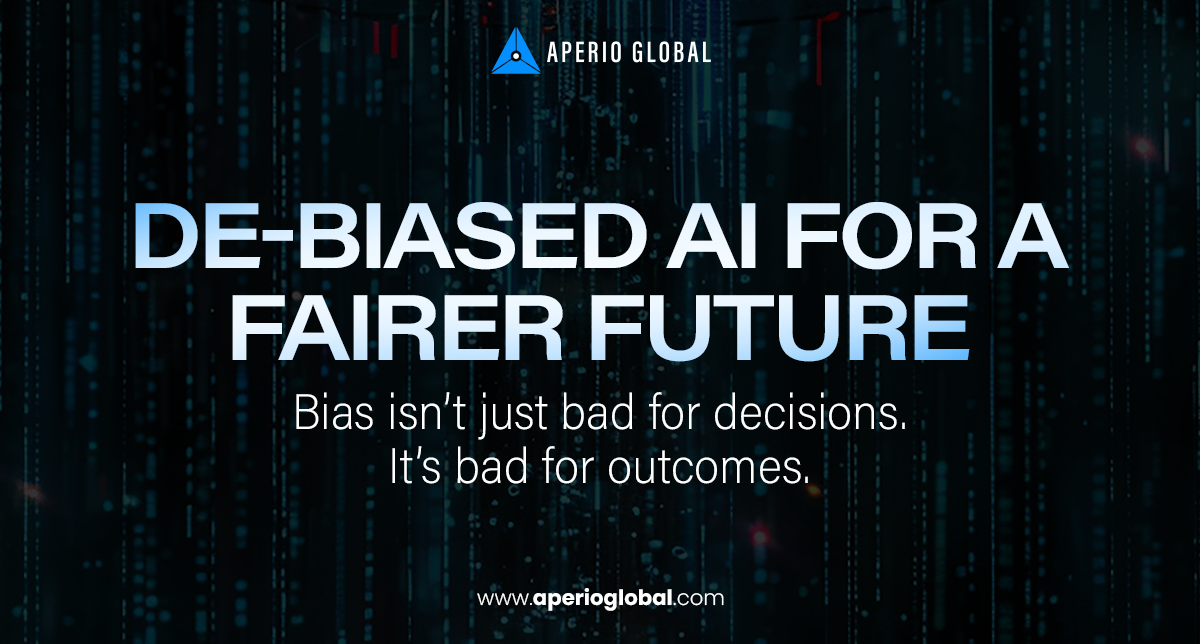
Bias isn’t just bad for decisions. It’s bad for outcomes. See how Aperio leads with fair, accurate AI technology — built for trust in the most mission-critical environments.
The Hidden Threat Inside the Algorithm
Artificial intelligence is reshaping how governments, militaries, and intelligence communities operate. From threat detection to decision support, AI is helping agencies move faster, see farther, and act with greater precision.
But there’s a less visible risk that can quietly erode these advances: algorithmic bias.
Bias in AI isn’t always obvious. It often lives in the data we train on, the assumptions we build into models, and the systems that quietly amplify disparities. Yet its consequences are far-reaching. Biased AI doesn’t just lead to flawed conclusions — it undermines trust, introduces operational vulnerabilities, and can skew mission outcomes at scale.
At Aperio Global, we believe the future of defense and intelligence hinges not only on AI that is powerful — but on AI that is fair, transparent, and accountable. That’s why de-biasing is central to our AI development strategy.
Why Bias in AI Is a National Security Concern
AI bias is often treated as a technical issue. But in the context of national security, it becomes a strategic one.
Consider an AI system trained to flag potential insider threats. If the data it relies on reflects unconscious biases — whether demographic, geographic, or behavioral — it could unfairly target certain individuals or miss genuine risks.
In mission operations, biased models could:
- Misclassify entities based on flawed associations
- Undermine the credibility of threat intelligence
- Exclude critical perspectives in analytical assessments
- Erode trust between systems and their human operators
In short, AI bias doesn’t just threaten data integrity — it threatens operational integrity.
Aperio’s Commitment to Responsible, De-Biased AI
Aperio Global is not just building AI tools. We’re building mission-aligned systems that are auditable, explainable, and de-biased from the ground up.
Our approach to de-biasing isn’t retroactive — it’s proactive. We embed fairness and transparency into every stage of our AI lifecycle:
1. Data Integrity Begins at Ingestion
We start by addressing the source: the data. Our systems — including RUSSEL, our patented preprocessing platform — are designed to cleanse, normalize, and tag data at scale. This helps eliminate duplicate signals, detect anomalies, and expose embedded patterns that could indicate bias.
By cleaning and organizing data before it ever touches a model, we’re already mitigating the biggest contributor to algorithmic skew: inconsistent or unrepresentative inputs.
2. Model Transparency Is Not Optional
At Aperio, we design AI models that are explainable by design. We don’t rely on black-box predictions — especially in domains where human judgment, legal scrutiny, and mission-critical decisions depend on clarity.
Our models include mechanisms for traceability, allowing users and stakeholders to understand not just what the AI recommended, but why.
3. Bias Testing and Mitigation Are Continuous
We subject all AI models to iterative bias testing across gender, race, geography, behavior, and context-specific variables. Where patterns of imbalance emerge, we deploy targeted remediation — whether through training data adjustments, algorithmic recalibration, or additional human oversight.
This isn’t a one-time process. We treat bias management as an ongoing operational requirement, not a one-off check.
Setting the Standard in Mission-Grade Fairness
In the federal space, trust is mission-critical. AI systems must not only function — they must reflect the highest standards of equity, accuracy, and accountability.
Aperio is proud to be part of a growing movement that puts responsible AI at the forefront of defense innovation. We partner with government clients to ensure our AI solutions meet ethical, technical, and operational expectations. Our work aligns with emerging federal standards on AI governance, as well as broader initiatives like NIST’s AI Risk Management Framework.
But we don’t stop at compliance. We aim to lead.
Our teams actively contribute to advancing practices in:
- Ethical AI auditing
- Diversity-aware model training
- Human-in-the-loop review frameworks
- Bias-aware algorithm development
These aren’t just features — they are foundational pillars of our approach.
Why This Matters Now
As AI adoption accelerates across national security, the systems we deploy today will shape the outcomes of tomorrow. If we ignore bias, we risk building architectures of inequality and error. If we address it, we unlock AI’s full potential — with integrity.
That’s why Aperio believes de-biasing AI is not just a technical responsibility — it’s a strategic imperative.
When AI is fair, it’s more accurate.
When AI is explainable, it’s more trusted.
And when AI is designed with accountability, it becomes a force for equity, insight, and mission effectiveness.
Final Thought: A Fairer Future Starts with Smarter AI
Bias isn’t just bad for decisions. It’s bad for outcomes. And in the high-stakes world of national security, the cost of getting it wrong can be measured in more than missed opportunities — it can be measured in risk, mistrust, and lost ground.
Aperio Global is leading the way in building AI systems that don’t just perform — they respect the complexity of the mission, the data, and the people behind the decisions.
In a world driven by data, we’re working to ensure that every line of code, every insight, and every action reflects a commitment to fairness, clarity, and integrity.
Discover how Aperio’s AI solutions are setting the benchmark for responsible innovation at aperioglobal.com